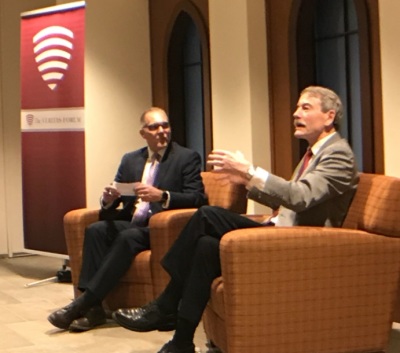Christian Author, Physicist Notes Reasons Why Scientism Doesn't Work

A notable Christian author and physicist who has often spoken at universities on the issue of science and faith has stated that a science-only worldview is not practical.
Merriam-Webster defines "scientism" in part as being "an exaggerated trust in the efficacy of the methods of natural science applied to all areas of investigation (as in philosophy, the social sciences, and the humanities)."
Ian Hutchinson, plasma physicist and Professor of Nuclear Science and Engineering at the Massachusetts Institute of Technology, explained the shortcomings of scientism in an interview with The Veritas Forum.
The scientist argued that scientism is a widely-held "erroneous belief" that fails in part because science is inherently incapable of proving the existence of various "intangibles of this world."
"It doesn't prove there's such a thing as justice or mercy or love and yet those are realities in our world that we all recognize and consider to be very important," said Hutchinson.
"And it's the same way with theological questions. They are important, they're vital, and yet they are not susceptible to being investigated by science."
Hutchinson also critiqued scientism by noting that many major figures in the history of science were also devout Christians, which meant that they did not adhere to scientism.
"The people who founded the Scientific Revolution in the 17th century were by-and-large religious believers, mostly Christians," he continued.
"They certainly believed that much of what we know comes from sources outside of science ... they were people who believed in miracles, by-and-large. At the very least, they believed in the miracle of the Resurrection."
Hutchinson also spoke about how he felt there was an "openness" in science to examine the significance of "religious things," citing as an example the American Association for the Advancement of Science's program, the Dialogue on Science, Ethics, and Religion.
Created in 1995, the AAAS' website notes that the program seeks to foster "communication between scientific and religious communities." Its stated goals include improving scientific understanding among religious communities, increasing "the engagement of scientific communities in the dialogue on science, ethics, and religion," and fostering collaboration between "scientists, ethicists, and religion scholars and leaders" on "critical multidisciplinary issues related to science, ethics, and religion."
His comments echo remarks he made at a Veritas Forum event titled "Can Science Explain Everything?" held at Quinnipiac University in April.
The common idea that science and faith are in conflict with one another has been rejected by historians who specialize in the history of science, he noted.
"That has been thoroughly debunked by historians of science in the past 50 years as untrue to history. Serious Christians, including clergy, were predominant in developing modern science for centuries," he said at the April event.
"But the myth still exerts powerful influence both on secularists and very often also on Christians. It's sustained by a frequent claim that there's no evidence for Christianity, but that's untrue."
The Hutchinson interview was released the same month as the publication of the physicist's latest book, Can a Scientist Believe in Miracles?
The apologetics book is a compilation of hundreds of questions he has received from students about science, theology and his Christian faith.
"Without minimizing challenging questions, he explores how science and Christianity are mutually supportive and intellectually consistent. Both God and science truthfully address our curiosity and destiny. Find answers to your deepest questions," the publisher, IV Press, states.
Hutchinson believes that his new book will have two distinct types of readers: Christians who want to better understand the relationship between faith and science, and non-Christians who are interested in the question of how compatible science and faith are.
"What I want both of those groups to do is, first of all, to recognize that the question is really important. The big questions of life," Hutchinson said.
"That's what my book wants to help people to be able to do, is to come back to the big questions of life, to do so with a better understanding of both science and of Christianity."



























